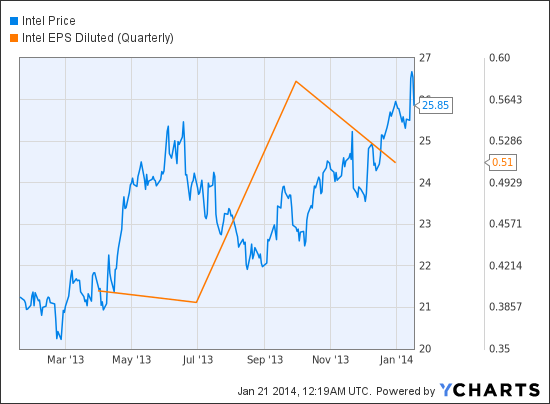Intel's Earnings Confirm PC Recovery But Disappoint Investors
It's no secret that Intel shares are underperforming recently. On Jan. 16, the company announced that net profit for the fourth quarter of 2013 rose 6.4% to $2.63 billion The company's revenue also increased 2.6%, reaching $13.83 billion. The market reaction? Shares dropped more than 4% premarket.
Notice that despite the moderate improvement in top line, from an earnings-per-share perspective, the company missed the consensus. This was due to a 1% higher provision for income.
However, although Intel missed earnings per share guidance by a penny, it also managed to increase its operating income 12% year-over-year, and keep revenue from its troubled PC client group flat, at $8.6 billion. These are outstanding achievements for a company facing fierce competition from ARM Holdings and Advanced Micro Devices in the mobile and server segments. But why did the market punish Intel despite top-line improvement?
Source: YCharts
The curse of high expectations
To be fair, Intel had positive results. For the first time in several quarters, Intel saw its PC business sales remain flat on a year-over-year basis. Even in terms of profitability, gross margin came ahead of expectations by one percentage point.
However, Intel's results were clearly not enough to satisfy investors' high expectations. This is because the Street is aware of the recent general recovery in the PC industry, and was expecting Intel to do something more than just keeping PC sales flat. Instead, it seems it will be Intel's third year in a row with no annual revenue growth.
The PC market may have finally hit bottom
As Quartz contributor Christopher Mims notes, Intel's latest earnings call is a confirmation that the hard times for the PC market may be over.
The world's largest dedicated independent semiconductor foundry, Taiwan Semiconductor Manufacturing Company , recently reported a big batch of orders from PC chip clients for delivery in the second half of 2014, indicating a rebound in PC sales at the consumer level is in the making, as it takes at least one quarter to manufacture notebooks.
These results are consistent with a note published a few weeks ago by Citi, which upgraded Intel based on the improvement and stabilization of PC demand.
Searching for meaningful growth
The recovery of the PC industry is good news for a company like Intel, which holds roughly four fifths' share in the microprocessor market, according to Morningstar. However, the stabilization of global PC demand may not be enough for Intel to deliver sustainable revenue growth.
The company needs to start generating meaningful revenue from segments with better future growth prospects, such as mobile chips. There's plenty of evidence suggesting that ARM-based tablets are cannibalizing PC sales. And although they may never completely replace the concept of PC, mobile devices -- from tablets to Internet of things' gadgets -- are set to dominate the future of consumer computing.
To achieve meaningful growth, Intel needs to increase its market share in the mobile semiconductor space, as soon as possible. This space is currently dominated by ARM, which uses a business model based on selling its intellectual property, rather than directly manufacturing chips. This allows ARM to leverage a fixed initial investment into a sustainable cash flow stream.
To become competitive in this field, Intel needs a sound technological and business strategy. In terms of technology, Intel needs to manufacture chips highly optimized for mobile. In other words, it needs to reduce the power consumption needs of its x86 architecture as much as possible. The company's Atom processors are a good attempt to increase power efficiency, but there's still a technological gap between ARM and Intel when it comes to mobile.
From a business perspective, Intel needs an aggressive pricing strategy for its mobile chips. This is because there are already plenty of mobile devices based on ARM technology. Manufacturers need a big incentive to change their hardware specification.
Final Foolish takeaway
Intel's latest earnings were a mixed bag. The results are consistent with the rumors that global PC demand may be stabilizing, benefiting Intel and Taiwan Semiconductors, among other companies with high PC exposure. However, the recovery of the PC industry won't be enough for Intel -- a company with $53 billion in annual revenue -- to generate attractive growth. With or without PC recovery, Intel needs mobile to achieve meaningful growth.
This is one tech stock that's not stalling out
Opportunities to get wealthy from a single investment don't come around often, but they do exist, and our chief technology officer believes he's found one. In this free report, Jeremy Phillips shares the single company that he believes could transform not only your portfolio, but your entire life. To learn the identity of this stock for free and see why Jeremy is putting more than $100,000 of his own money into it, all you have to do is click here now.
The article Intel's Earnings Confirm PC Recovery But Disappoint Investors originally appeared on Fool.com.
Adrian Campos has no position in any stocks mentioned. The Motley Fool recommends Intel. The Motley Fool owns shares of Intel. Try any of our Foolish newsletter services free for 30 days. We Fools may not all hold the same opinions, but we all believe that considering a diverse range of insights makes us better investors. The Motley Fool has a disclosure policy.
Copyright © 1995 - 2014 The Motley Fool, LLC. All rights reserved. The Motley Fool has a disclosure policy.


